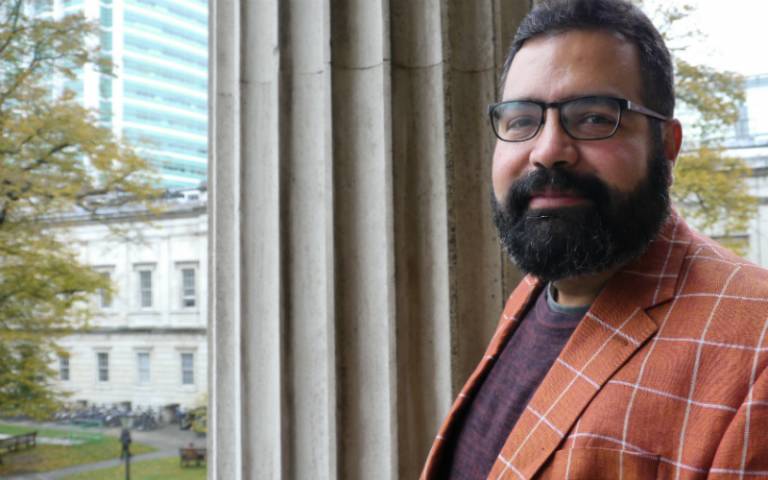My route to Principal Teaching Fellow: Nephtali Marina-Gonzalez
Dr Neph Marina-Gonzalez talks about research-based education, his approach to teaching applied medical sciences and the UCL Academic Career Framework

16 October 2018
Dr Marina-Gonzalez joined UCL in 2004, became a British Heart Foundation Research fellow in 2012 and has recently become undergraduate year 1 lead in the Faculty of Medical Sciences.
You’ve just been promoted to Principal Teaching Fellow. What is your role?
As a Year 1 lead, I am responsible for academic leadership, management and assessment of the basic science undergraduate programmes in the Faculty of Medical Sciences.
I am module lead for our year 1 modules Cardiovascular and Respiratory Function in Health and Disease (MEDC0002) and Functional Anatomy and Medical Imaging (MEDC0008).
Why is it important?
Good scientists need to be creative to solve problems.
Our course is leading the way for UCL by encouraging inventiveness, creativeness and independence but most of all, innovation. We don’t simply teach students the facts, but also how to learn on their own and how to use the information they acquire.
What are the challenges and how are you addressing them?
Physiology lies at the core of basic medical sciences education.
However, significant challenges have emerged in recent years mainly due to its fragmentation into many specialities and the dramatic reduction of physiology teaching in the undergraduate medical sciences curriculum. This has been accompanied by significant increases in the number of students, outgrowing the capacity of staff and space available to teach appropriately.
UCL has a great tradition in physiological sciences and it is my hope to keep the tradition alive and make physiology great again!
To improve the way we teach physiology, in 2017 I took a fractional secondment with the Connected Curriculum team in the Arena Centre for Research-based Education.
This gave me the chance to lead several educational research projects within UCL in collaboration with other overseas universities and resulted in the implementation of innovative educational strategies which have greatly inproved students’ experience and academic achievement.
What’s the best thing about your job?
The intellectual freedom to implement innovative educational solutions.
As an experimental physiologist, I never conducted educational research studies, but I was fortunate enough to join the Connected Curriculum team and have fantastic mentors like Dilly Fung, Brent Carnell and Vincent Tong. Their guidance has been pivotal in my educational career.
I have developed robust collaborations with colleagues from Spain, implementing active learning solutions in their undergraduate clinical medicine modules. I am also collaborating with groups from Denmark and the Netherlands in the implementation of novel educational strategies based entirely on open-access simulators that make educational experiences more realistic, engaging and modern.
What do you think of the new Academic Career Framework?
Prior to the publication of the Academic Career Framework I went through one unsuccessful attempt for promotion. Now the guidelines are very clear and I personally found the new Framework extremely useful as it helped me connect the dots to build a well-balanced portfolio of research, education and Institutional Citizenship and make a strong case for promotion. It was an instant success!
What are your thoughts on the status of teaching at UCL?
Things have improved a lot in recent years.
There is a more positive attitude towards education and the Higher Education Academy fellowship scheme is making more junior scientists become actively involved in high-quality education. However, we still have a long way to go and we have to work together as an institution to ensure we improve overall student satisfaction and only then we will be able to obtain higher scores in areas in which UCL are consistently showing poor scores, such as in assessment and feedback.
What achievements helped you to make a case for promotion?
- I was a British Heart Foundation Intermediate Basic Research Science fellow for 4 years. I believe that my research conducted at UCL has made a significant contribution towards our understanding of (i) fundamental mechanisms controlling breathing and arterial blood pressure and (ii) the general biology and physiological role in the nervous system of ATP-mediated purinergic signalling.
- The educational research projects I led as a Connected Curriculum fellow were a decisive factor that made my case for promotion successful.
- I was awarded a postgraduate certificate in higher education by CALT (now the Arena Centre for Research-based Education).
- I provided compelling evidence of impact of my contribution to several departmental committees.
- I provided evidence of impact of the initiatives I led in support of the Connected Curriculum across the Institution.
- I provided evidence of impact about engaging UCL staff and students with the Connected Curriculum.
 Close
Close

